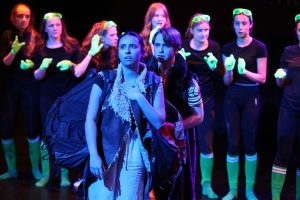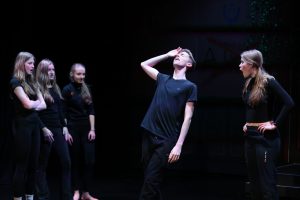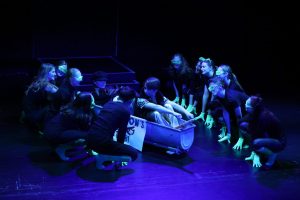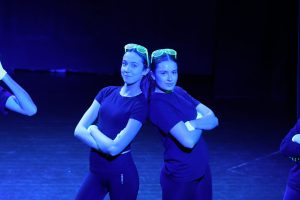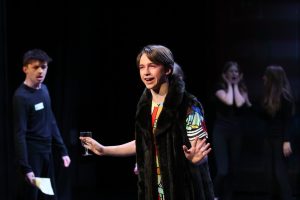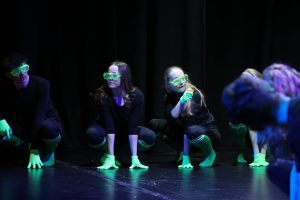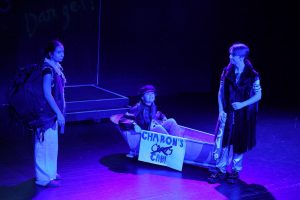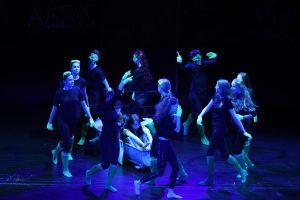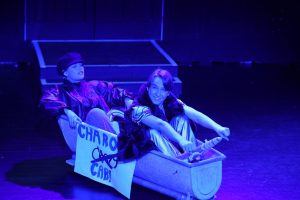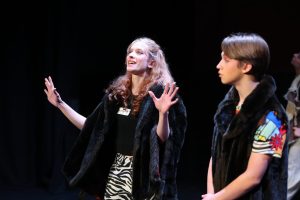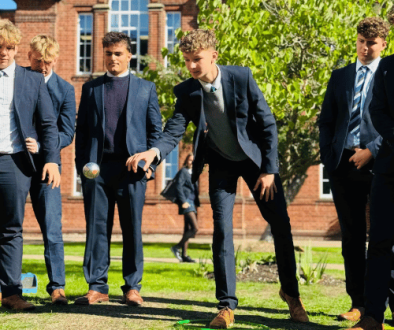‘The Frogs’ Creates “A Lively Blend of Ancient Comedy with a Modern Twist”
Last week the Senior Drama Scholars’ performance of Aristophanes’ ‘The Frogs’ took to the stage for two consecutive nights. Head of English, Mr Nick Phillips, shares the following review of the performance.
This has been a busy time for Drama at RGS, with last week’s production of ‘The Frogs’ coming along soon after the success of ‘Clue’. It was now the turn of the Senior Drama Scholars, and they delivered a very lively and spirited production. Aristophanes’ play is challenging in many ways, and this was an admirable production with a great deal in it to enjoy. As any actor will tell you, comedy is more difficult to master than non-comedic material; comedy that is nearly 2,500 years old is even more demanding. To see such relatively young performers take on this challenge in the original and entertaining way in which they did is greatly to their credit.
Amongst several strong performances, a few deserve particular mention. The role of ‘Dionysus’ is a tough one, and Kieran Lilley was impressive as the god of wine and revelry, particularly in those scenes with Mya Walford, who played his slave ‘Xanthias’. The pairing belongs to a great comic tradition where frequently the servant gets the better of the master, and both delivered strong performances. Callum Lockett and Amy Saunders were amusing and entertaining as the squabbling playwrights: they managed to sustain the play’s comic momentum while simultaneously navigating some impressive verse speaking and esoteric ideas about the relationships between society and literature.
Throughout the play, the ‘Chorus’ provides a series of commentaries upon the action presented on stage, as well as a discussion of its moral and political implications. This material is complex and will be, more often than not, largely unfamiliar to a modern audience; the convention of choric speaking itself is also something that we do not immediately recognise as obviously dramatic, given our diet of box sets and blockbusters. Nevertheless, the actors managed to make these sections interesting and engaging: this is a credit to their theatrical skill and the director’s imaginative conception of these scenes. The whole cast contributed to the production’s energy, wackiness and sense of fun. Finally, Charlie Raven was noticeably good as ‘Aeacus’: playing the role of camp sadist to glorious effect. He generated the evening’s biggest laughs, and his Trainspotting-inspired Scottish accent was a pitch-perfect delight.
The production blended the ancient and modern very effectively at times. Searching questions about politics, language and the role of literature in society were debated alongside scenes fizzing with zany slapstick and physical comedy. The esoteric and erudite were meshed interestingly with references to popular culture and film. The combination of ‘Euripides’, and ‘Aeschylus’ with Vanilla Ice was one few expected and these mash-ups worked well.
For a number of performers, this will be the last time they appear on stage at RGS. Many have appeared in plays since they were in Year Seven and have provided audiences with some wonderful moments. We wish these pupils all the very best in their future endeavours and give thanks to them for all they have done as Drama Scholars and performers, whether on stage or behind it. Most of all they have helped and inspired a new generation of actors who will, no doubt, carry on their superb work.
Mr Nick Phillips, Head of English

